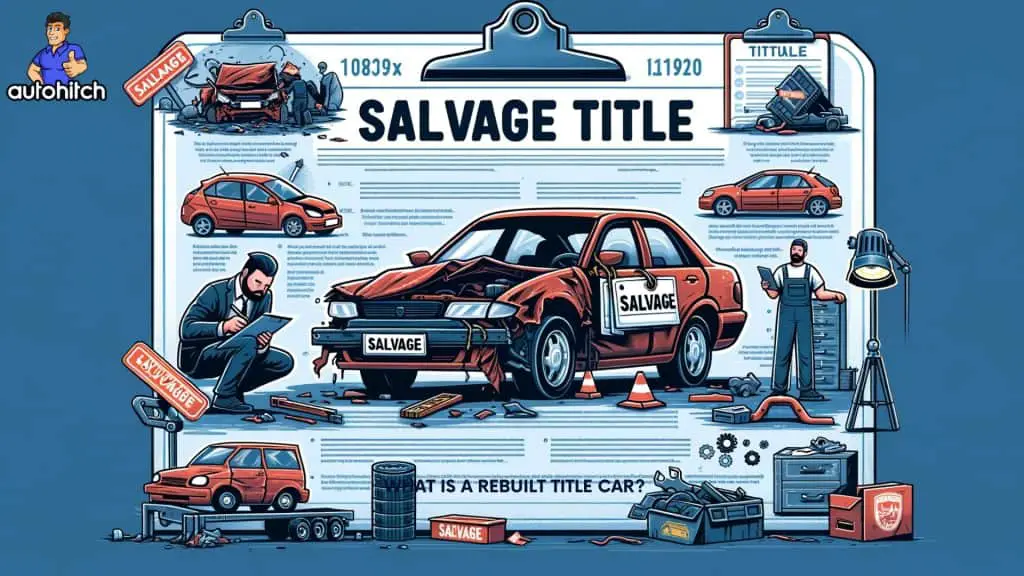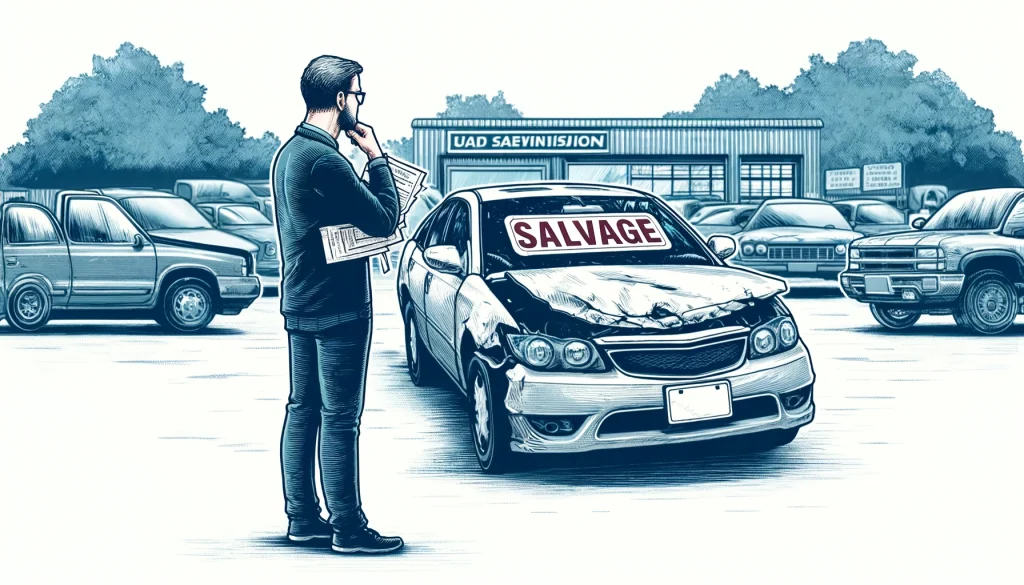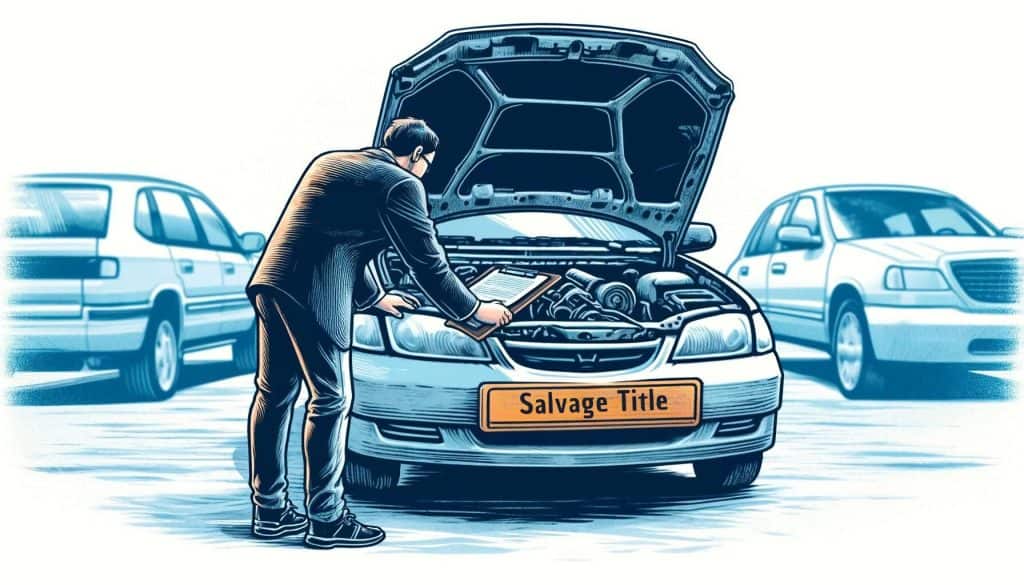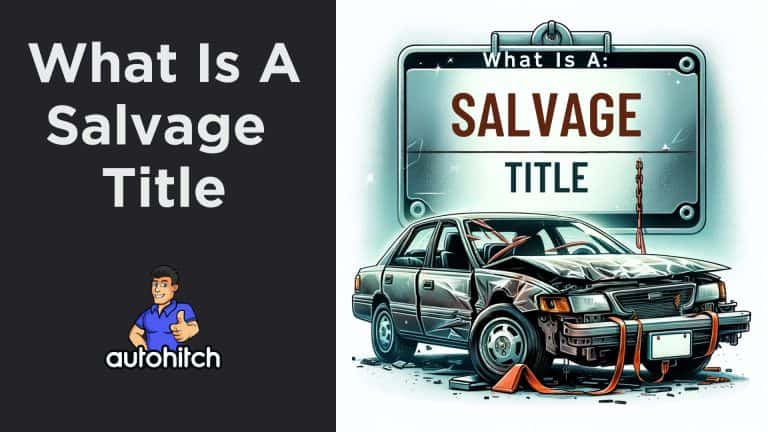If you come across a used car at an amazing price but it has a salvage title, you may be wondering: What is a salvage title?
A salvage title is a type of vehicle title issued when a car has suffered significant damage and has been deemed a total loss by the insurance company. This typically occurs when the cost to repair the vehicle exceeds a certain percentage of its market value, usually ranging from 60% to 100%, depending on the state.
Key Point: Salvage cars cannot be legally driven!
Below I will dig a bit deeper and explain how cars become salvage, how a salvage car can be made legal again, and the pros and cons of buying these cars,
Highly Relevant Articles To Read:
- Can You Get Insurance For a Salvage Title Car
- Can a Dealership Sell a Car With a Salvage Title
- How to Turn a Salvage Title into a Rebuilt Title
- What is a Rebuilt Title?
- Junk Car vs Salvage Car
- Can You Finance a Salvage Title Car
- Banks That Will Finance Salvage Title Cars.
Table of Contents

Reasons a Vehicle Receives a Salvage Title
There are several reasons why a vehicle might be given a salvage title:
- Accidents: If a vehicle is involved in a severe accident that causes extensive damage to its frame, body, or mechanical components, it may be deemed a total loss by the insurance company.
- Natural Disasters: Vehicles that have been damaged by floods, hail storms, or fires may also receive salvage titles if the cost of repairs exceeds the threshold set by the insurance company.
- Theft and Vandalism: In some cases, stolen vehicles that have been stripped of valuable parts or severely vandalized may be given salvage titles.
The Pros and Cons of Buying a Salvage Title Vehicle
- Lower Purchase Price: Salvage title vehicles are often sold at a significant discount compared to similar cars with clean titles, sometimes up to 50% less.
- Opportunity for DIY Repairs: If you have mechanical skills, you may be able to repair a salvage title car yourself, saving even more money.
- Rare or Classic Cars: Some older or rare vehicles may have salvage titles due to minor damage that exceeded their low book value. In these cases, a salvage title car can be a great way to obtain a unique vehicle at a lower cost.
Risks and Drawbacks
- Unknown Repair Quality: It can be difficult to assess the quality of repairs made to a salvage title vehicle, which could lead to safety concerns or future mechanical issues.
- Difficulty Insuring: Some insurance companies may not offer full coverage for salvage title vehicles or may charge higher premiums.
- Lower Resale Value: Even if a salvage title car is fully repaired, it will likely have a lower resale value than a comparable vehicle with a clean title.
- Potential for Fraud: Some sellers may attempt to conceal a car’s salvage history through “title washing,” making it crucial to thoroughly research a vehicle’s background.
Should You Buy a Car With a Salvage Title?

In my professional opinion, as a former used car dealer, most buyers are better off sticking with buying a car with a clean title. But for some specific situations, a salvage vehicle can make sense:
- You have mechanical skills to inspect repairs
- The damage history is fully known
- The car is rarely driven
- You must pay cash due to no financing
Inspecting and Researching a Salvage Title Vehicle

If you’re still considering purchasing a salvage title car, take the following steps to protect yourself:
- Obtain a Detailed Vehicle History Report: Services like Carfax and AutoCheck can provide valuable information about a car’s past, including accidents, repairs, and title status.
- Have a Trusted Mechanic Inspect the Vehicle: A professional inspection can help uncover any hidden damage or subpar repairs that could affect the car’s safety and reliability.
- Research the Vehicle’s Market Value: Tools like Kelley Blue Book and NADA Guides can help you determine a fair price for the vehicle based on its condition and title status.
- Understand Your State’s Laws: Salvage title regulations vary by state, so it’s important to familiarize yourself with the specific requirements for registering and insuring a salvage title vehicle in your area.
Salvage vs. Rebuilt Title
| Title Type | Description | Legal Status |
|---|---|---|
| Salvage Title | Issued when a vehicle is declared a total loss by an insurance company due to significant damage. | Not drivable or registrable until repaired and inspected. |
| Rebuilt Title | Issued for a salvage title vehicle after it has been repaired to a roadworthy condition and passed a state inspection. | Legal to drive and can be registered. |
There is an important distinction between a salvage title and a rebuilt title:
- Salvage title – Damaged car deemed a total loss. Not drivable legally.
- Rebuilt title – This is a salvage title car that’s been repaired, inspected, and certified as roadworthy again.
So a rebuilt title car has gone through the process of rebuilding after being declared salvage, while a salvage title indicates the car still needs those repairs.
Related Articles to Read:
Does a Salvage Title Affect Car Insurance?
Yes, a salvage title will affect insurance because with a salvage title you will not be able to get insurance. Once you get the vehicle rebuilt, expect your insurance rates to increase by 20-50% based on the extent of the original damage.
Related topic to read: Does a Salvage Title Void a Recall?
State Salvage Title Regulations
It’s critical to research regulations in your state. Key differences include:
- Damage thresholds to trigger a salvage title
- Total loss definitions
- Branding rules for theft recoveries
- Inspection requirements for rebuilt titles
For example, Kansas sets a 70% damage threshold, while New York uses 80%. The salvage and rebuilt title process can vary widely.
Salvage Title Regulations Table by State:
| State | Damage Threshold for Salvage Title | Additional Notes on Rebuilt/Salvage Titles |
|---|---|---|
| Alabama | 75% | Rebuilt title requires repairs, inspection, and documentation |
| Alaska | Based on damage percentages | |
| Arizona | – | Salvage titles issued for stolen/recovered vehicles; inspection and documentation required for rebuilt title |
| Arkansas | 75% | |
| California | Set by insurers | Stringent rebuilt title requirements |
| Colorado | – | Salvage titles not issued for collector vehicles; inspection required for rebuilt title |
| Connecticut | 70% | |
| Delaware | – | Branded titles indicate if the vehicle is rebuildable |
| Florida | Insurer declaration | Insurer declares total loss; specific salvage designations based on damage |
| Georgia | Total loss or >75% damage | Rebuilder’s license required for rebuilt title |
| Hawaii | 75% | |
| Idaho | 80% | |
| Illinois | – | Salvage titles issued for stolen/recovered vehicles; inspection required for rebuilt title |
| Indiana | 70% | |
| Iowa | 50% | |
| Kansas | 75% | |
| Kentucky | – | Damaged, rebuilt, or water-damaged brands |
| Louisiana | 75% | |
| Maine | 70% | |
| Maryland | – | Salvage titles issued for stolen/recovered vehicles |
| Massachusetts | 70% | Stringent rebuilt title inspection |
| Michigan | 75-90% gets salvage title, 91%+ gets scrap title | |
| Minnesota | – | Salvage titles issued for stolen/recovered vehicles; inspection required for rebuilt title |
| Mississippi | 75% | |
| Missouri | – | Insurer declares total loss regardless of damage |
| Montana | 80% | |
| Nebraska | 75% | |
| Nevada | – | Specific designations for rebuildable and salvage |
| New Hampshire | 70% | |
| New Jersey | – | Salvage titles issued for stolen/recovered vehicles; stringent rebuilt title requirements |
| New Mexico | – | Salvage titles issued for stolen/recovered vehicles |
| New York | Salvage titles for stolen/recovered vehicles | Salvage titles issued for stolen/recovered vehicles; stringent rebuilt title requirements |
| North Carolina | 75% | |
| North Dakota | 75% | |
| Ohio | – | Salvage titles issued for abandoned vehicles |
| Oklahoma | – | Salvage titles issued for stolen/recovered vehicles |
| Oregon | 70% | Salvage titles issued for stolen/recovered vehicles |
| Pennsylvania | Set by insurer | Stringent rebuilt title inspection |
| Rhode Island | 70% | |
| South Carolina | 75% | |
| South Dakota | – | No salvage title laws |
| Tennessee | – | Specific rebuilt title requirements |
| Texas | 80% | |
| Utah | 70% | |
| Vermont | 80% | Stringent rebuilt title inspection |
| Virginia | 75% | |
| Washington | 75% | |
| West Virginia | 75% | |
| Wisconsin | 70% | Stringent rebuilt title inspection |
| Wyoming | 75% |
Frequently Asked Questions
Can I insure a salvage title vehicle?
It depends on the insurance company and the state. Some insurers may only offer liability coverage, while others may not insure salvage title vehicles at all. It’s best to check with your insurance provider before making a purchase.
Are salvage title cars always cheaper?
In most cases, yes. However, the discount will vary depending on the extent of the damage and the demand for that particular make and model.
Can I finance a salvage title vehicle?
Financing options for salvage title vehicles are limited, as many lenders view them as high-risk investments. You may need to seek out specialized lenders or be prepared to pay a higher interest rate.
How do I register a salvage title vehicle?
The process varies by state but typically involves having the vehicle inspected to ensure it’s roadworthy and meeting any specific requirements for salvage title cars. Check with your local DMV for more information.
My conclusion
Salvage title and rebuilt title cars can seem appealing due to potential cost savings, but most buyers are better off with a high-mileage used car with a clean title.
While they may work for certain buyers under specific circumstances, salvage vehicles come with increased safety, insurance, maintenance, and resale value risks to carefully weigh.




